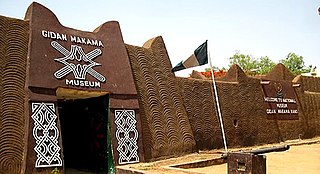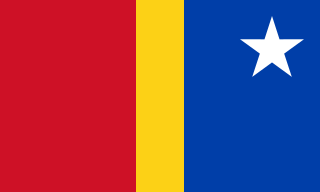Bagauda may refer to the following.
- Bagauda, the first monarch of the Kingdom of Kano
- Bagauda Dynasty of Kano
- Bagauda, a genus of thread-legged bugs
- Bagauda, Nepal, a village development committee (VDC) in Nepal
- Bagaudae, Ancient Roman peasants
Bagauda may refer to the following.
The Kano Chronicle is an Arabic-language manuscript that lists the rulers of Kano.

Kano State is one of the 36 states of Nigeria, located in the northern region of the country. As of the most recent national census (2006), Kano State is the most populous in Nigeria. The recent official estimates taken in 2016 by the National Bureau of Statistics found that Kano State was still the largest state by population in Nigeria. Created in 1967 from the former Northern Region, Kano State borders Katsina State to the northwest, Jigawa State to the northeast, Bauchi State to the southeast, and Kaduna State to the southwest. The state's capital and largest city is the city of Kano, the second most populous city in Nigeria after Lagos.
Ali Yaji Dan Tsamiya known as Yaji I was a king and later the first Sultan of Kano, a state in what is now Northern Nigeria. Yaji I ruled from 1359 to 1385 CE. A prominent figure in the state's history, using religious revolution, Yaji was finally able to solidify his family's grasp on Kano and its sub-kingdoms after centuries of strife.

Bebeji is a Local Government Area in Kano State, Nigeria. Its headquarters are in the town of Bebeji.

Gaya is a Local Government Area in Kano State, Nigeria. Its headquarters are in the town of Gaya in the north of the area.
Nasiru Sule Garo is a member of the House of Representatives of the Federal Republic of Nigeria.

Gidan Makama Museum Kano or Kano Museum is a museum in Kano, Nigeria. This building served as temporary palace of Kano before the current palace Gidan Rumfa was constructed in the 15th century The museum has a significant collections of arts, crafts and items of historic interest related to the Kano area. Located in a 15th-century historical building, which is recognised as a National Monument by the Government of Nigeria. The museum is divided into 11 galleries, each with their own centre of focus. Galleries include the Zaure or the main entrance hall with displays of traditional materials, city walls and maps of Kano, the history of statehood, Kano in the 19th century, the Civil War, economy, industry and music.
Audu Bako (1924–1980) was a Nigerian police officer and the first Governor of Kano State during the military regime of General Yakubu Gowon after the state was formed from part of Northern Region.

The Kano Emirate was a Muslim state in Northern Nigeria formed in 1805 during the Fulani jihad when the Muslim Hausa-led Sultanate of Kano was deposed and replaced by a new emirate which became a vassal state of the Sokoto Caliphate. During and after the British colonial period, the powers of the emirate were steadily reduced.
The Kingdom of Kano was a Hausa kingdom in the north of what is now Northern Nigeria that dates back before 1000 AD, and lasted until the proclamation of the Sultanate of Kano by King Ali Yaji Dan Tsamiya in 1349. The kingdom was then replaced by the Sultanate of Kano, under the suzerainty of a Muslim Sultan The capital is now the modern city of Kano in Kano State.

Ibrahim Dabo was the leader of the Fulani Sullubawa in Kano and founder of the eponymous Dabo dynasty. His progeny has lasted over two centuries reigning as Muslim rulers of the ancient city-state of Kano. The dynasty has become synonymous with the ancient city-state in affectionate sayings as "Kano ta Dabo Cigari". They have independently ruled the Kano Emirate from 1819 until the Battle of Kano in 1903 which as a result of British colonisation transformed into the Kano Emirate Council.
The Sultanate of Kano was a Hausa kingdom in the north of what is now Nigeria that dates back to 1349, when the contemporary King of Kano, Ali Yaji (1349-1385), dissolved the cult of Tsumbubra, accepted Islam and proclaimed Kano a Sultanate. Before 1000 AD, Kano had been ruled as an Animist Hausa Kingdom. The Sultanate lasted until the Fulani jihad in 1805 and the assassination of the Last Sultan of Kano in 1807. The Sultanate was then replaced by the Kano Emirate, subject to the Sokoto Caliphate. The capital is now the modern city of Kano in Kano State.
The following is a timeline of the history of the city of Kano, Nigeria.
Isyaku Rabiu was a Nigerian businessman and Islamic scholar who founded a major holding company in Kano State. He was a supporter of Ibrahim Niasse's Tijaniyyah brotherhood.
Barbushe was a hunter and pagan chief priest who was the most prominent leader of the indigenous animists of Dala, a place which would become the most important site in the history of the foundation of Kano, now a state in Northern Nigeria.
Muhammad Bugaya Dan Tsamiya, known as Bugaya, was a King of Kano who reigned from 1385 - 1390.
The Bagauda Dynasty is a house of noblemen who founded and ruled the Kingdom of Kano throughout its existence. The Dynasty spanned roughly 808 years spread out through ten centuries, one of the longest in recorded human history and produced 43 kings.
Bagauda, also known as Daud Bagauda or Yakano, was the King of Kano from 998 to 1063. As the founder of the Bagauda Dynasty, he is the first Hausa monarch listed in the Kano Chronicle.
Warisi was the King of Kano from 1063 to 1095. He was the son of Bagauda and Saju.